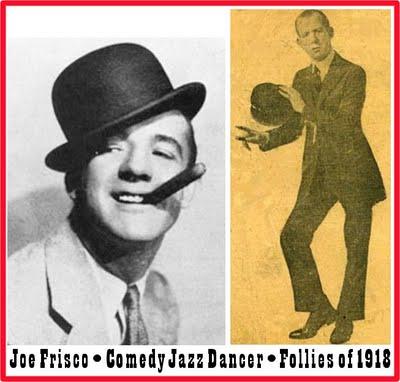"The International Jew" Study Hour - Episode 53
June 27, 2013

Carolyn Yeager and Hadding Scott read and comment on Chapter 48, “How the Jewish Song Trust Makes You Sing.”
Jews did not create the popular song, but they debased it. Before it became a Jewish industry, popular songs were created by individuals who worked for satisfaction, not the product of song factories whose goal was to “corner the market.” This chapter compares pre-1918 popular songs with Jewish jazz, an example of which was the self-proclaimed “King of Jazz” Joe Frisco (pictured right).
Another Jewish contribution was “The Vamp” – it started with Jew Morris Gest’s immoral theatre spectacle “Aphrodite.” Eddie Cantor, when singing Irving Berlin tunes, knew just how to roll his eyes at the suggestive parts of the lyrics to bring down the house, such as in You’d Be Surprised, about Johnny who wasn’t much in public, but when he got Mary home, or in any other private location, “you’d be surprised.”
The Music Publishers’ Association was organized by S. Silberman and M. Goodman, and eventually included all the Jewish song manufacturers. It still exists today.
Image: Joe “Frisco” Rooney (real name Louis Wilson Joseph) was a stuttering Jewish comedian whose jazz dance style named “Do the Frisco” was usually performed to the “Darktown Strutters Ball.” He shuffled his feet, rolled his hips and contorted his body. Variety called it the “Jewish Charleston.”
Note: We are using the Noontide Press publication of The International Jew — The World’s Foremost Problem which can be found online here as a pdf file.
Category
International Jew Study podcast, Jews- 561 reads










Comments
Original comments on this program
6 Responses
Lurker
June 27, 2013 at 11:20 pm
Max Headroom
Carolyn
June 27, 2013 at 11:56 pm
haha, thanks Lurker. I completely missed out on this character.
Hadding
June 29, 2013 at 10:29 am
Lili Marlene was written in 1915. I may have been wrong in saying that it was about a prostitute, although others have said that.
I was struggling to come up with an example of immoral songs from the Weimar period. I think the film Cabaret probably gives just a mild hint of that.
Here are what Richard Wallaschek and Willie Ruff (a Negro) had to say about the White origin of “Negro” music: How long have scholars known that Negro spirituals were a hoax?
Carolyn
June 29, 2013 at 11:40 am
Why struggling? It was a huge mistake to say Lili Marlene was a prostitute! Not “I may have been wrong …” but you definitely were wrong. Here are the English lyrics:
Underneath the lantern
By the barrack gate,
Darling I remember
The way you used to wait.
T’was there that you whispered tenderly
That you loved me;
You’d always be
My Lili of the lamplight,
My own Lili Marlene.
And in German:
Vor der Kaserne,
Vor dem großen Tor,
Stand eine Laterne,
Und steht sie noch davor,
So woll’n wir uns da wieder seh’n,
Bei der Laterne wollen wir steh’n,
Wie einst, Lili Marleen.
It’s a love song about nice girlfriend of a soldier, not a prostitute selling her wares under a street lamp. And naturally, if they met and kissed and spoke to each other under the streetlamp, they weren’t even having sex. That was not common among young people in Germany, where show of affection was tantamount to a marriage proposal!
For my part, I was trying to express the wholesome activity of group singing that young and adult people used to engage in (and not smut songs either; maybe just a little suggestive sometimes) … as so distinct from our entertainments of today.
Edward
June 30, 2013 at 2:01 am
I’d like state that I was a teenager at the time of Max Headroom and only new about the name from the idiots around me, but like Carolyn I also didn’t watch tv.
Lurker
June 30, 2013 at 10:54 pm
Edward – I was only a teenager too, I have to admit I enjoyed it [MH] at the time.